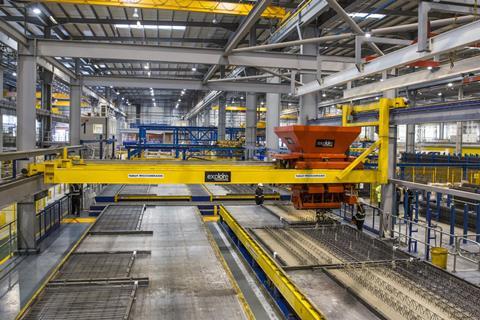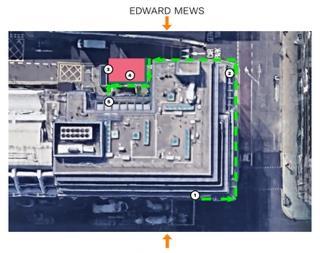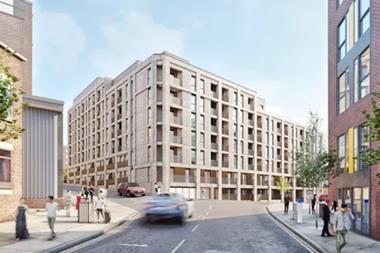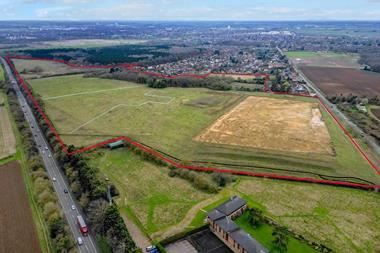Procurement for public and private construction projects must do more to encourage R&D investment and help steer the uptake of offsite manufacturing if Britain is to recover quickly from the Covid-19 crisis.

Innovation could be the “big winners” if procurement starts to focus on value and resilience rather than just price, Laing O’Rourke’s director of UK clients and markets has said in a wide-ranging discussion covering hospitals, housing and the modernisation of Britain’s construction sector.
You can listen to today’s podcast via Apple Podcasts or Spotify or SoundCloud or through the player below.
Céire O’Rourke says that procurement must do more to encourage the uptake of factory-built space in order for the construction industry to really get behind the innovation agenda. She believes there is a huge opportunity to create jobs, reduce our carbon footprint and improve the economy’s resilience if more is done to encourage R&D spending.
O’Rourke says Government procurement processes must set an example. She believes that if ministers were to award a greater number or portion of capital projects to companies using modern methods of construction (MMC) or which focus on design for manufacturing and assembly (DfMA), this would immediately encourage more private investment. Government can truly demonstrate that it is keen to get behind new, innovative ways of building, but it needs to update and modernise the way procurement works.
Over three years ago, Mark Farmer, now the government’s MMC champion for homebuilding, issued a stark warning in a report entitled, Modernise Or Die.
Laing O’Rourke, the UK’s largest privately-owned construction company, has successfully implemented one of the country’s most advanced offsite manufacturing methodologies. Focusing on DfMA, Laing O’Rourke, which is currently helping to deliver the Royal Liverpool University Hospital, has spent the last 11 years investing over £200 million into its offsite manufacturing capability, which is spread across two main factories in Nottinghamshire and Oldbury.

Between them, the factories can deliver products such as modular mechanical and electrical plant installations, bridge and platform systems for the rail industry and completed ‘pods’ used to assemble buildings for a range of uses, including housing, education facilities and hospitals.
O’Rourke explains that Laing O’Rourke operates using a 70-60-30 metric for their projects - which span across engineering, building construction and infrastructure.
“When we look at projects, we say can we deliver 70 percent of it offsite? If so, it leads to a 60 percent increase in productivity and a 30 percent reduction in delivery time.”
Laing O’Rourke applied this exact metric to deliver the Grange University Hospital in South Wales. In April, the company announced they had delivered sections of the hospital a year earlier than originally planned, enabling an extra 384 beds to become available for the NHS as it stepped up its fight against the Covid-19 outbreak.
O’Rourke explains how this feat was possible. “The biggest facilitator is having a good design team across all disciplines. We now believe we have a blueprint for delivering hospitals in two or three years - at least a year ahead of traditional methods.”
However, it isn’t just the pace of development that makes offsite manufacturing so impressive.
As O’Rourke puts it, “quality is one of the unsung heroes of MMC because by working in a factory environment the quality you can provide for the product is second to none.”
Equally impressive is MMC’s sustainability credentials.
By manufacturing offsite, Laing O’Rourke is able to create buildings that are more airtight. This means less heat escapes, resulting in long-term savings on energy use and maintenance costs. In addition, digital technology allows the company’s design teams to generate precise estimates of materials needed for each project, meaning waste is minimised.
But for sustainability to be a successful agenda, O’Rourke notes that “you can’t go after everything – if we do, it might never happen. If we break it down into bite sized pieces, there is every chance we’ll be able to succeed.”
She continues by saying, “it’s going to take investment. That shouldn’t just sit with the contractors or supply chain partners. It has to be everyone together. For example, if a client wants to build a sustainable building in central London, they may have to accept that it can’t be done for the same price as traditional. It has to be everyone investing for the future.”
Like most offsite manufacturers, Laing O’Rourke’s design teams use digital tools to measure and benchmark the performance of their factory-built space. Built Information Modelling (BIM) – which allows design teams to create a digital twin of buildings – ensures costly defects are ‘designed out’, with clash checks and advanced geometry rules providing precise alignment checks and measurements.
However, O’Rourke has been disappointed with the pace in which companies have taken up digital design technology, such as BIM. “The challenge is that there isn’t a standardised system. So there are different interpretations of digital engineering.”
“I’m not advocating there should be one system, but we need to figure out a way that the different [digital design] systems can talk to each other. We need a way that people can be individual in the way that they work, because that’s part of the consultant brand, but you need a common platform that everyone can feed into. This would be a game changer.”
“The challenge you have is when clients across the whole spectrum [housing, education, healthcare, infrastructure] say that they want quality, but when it comes down to the procurement process price is the big winner,” O’Rourke says. “This doesn’t lend itself to an environment where you invest thousands or millions of pounds into a new, more efficient way of working.”
Céire O’Rourke is Laing O’Rourke’s director of UK Clients and Markets
You can listen to today’s podcast via Apple Podcasts or Spotify or SoundCloud or through the player above. This podcast was produced by Blackstock Consulting founder Andrew Teacher and you can Tweet your views @andrewjteacher
Join the debate and hear more at the RESI Convention www.resiconf.com organised by Property Week.
LISTEN TO PREVIOUS EPISODES:
- Episode 1: Rosie Toogood, Legal & General Modular Homes - Apple Podcasts, Spotify and SoundCloud
- Episode 2: Dave Sheridan, ilke Homes - Apple Podcasts, Spotify and SoundCloud
- Episode 3: Harry Swales, Homes England - Apple Podcasts, Spotify and SoundCloud
- Episode 4: Joseph Daniels, Project Etopia - Apple Podcasts, Spotify and SoundCloud






























No comments yet